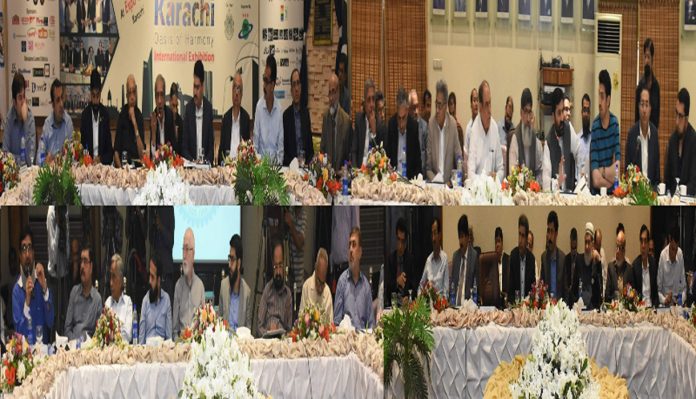KARACHI: Participants of a Convention comprising Chambers of Commerce & Industry and Trade Associations from different areas of the country Wednesdayunanimously agreed to collective raise voice for resolving issues being faced by the trade and industry due to anti-business taxation policies.
In his welcome remarks, Vice Chairman BMG & Former President KCCI Haroon Farooki stated that in order to deal with massive discretionary powers granted to the FBR through Finance Bills every year since 2013, KCCI organized a similar convention last year in February 2017 to urge the government to immediately stop FBR from harassing the business community. Subsequently, KCCI delegation also held meeting with the then Chairman of Senate’s Standing Committee on Finance Saleem Mandviwala who ordered the FBR to stop conducting raids and it was really heartening to see that relief was immediately provided to the business and industrial community as FBR halted raids from March 2017 onwards.
While appreciating the seriousness exhibited by Saleem Mandviwala towards resolving the issues being faced by business and industrial community, the Convention participants congratulated him on his election as Deputy Chairman Senate of Pakistan. They were confident that the business community will witness better policies and improved business climate during Saleem Mandviwala’s tenure as Deputy Chairman Senate, which would surely prove helpful in creating a pro-business environment across the country.
According to the Joint Communique issued at the end of the Convention, all Chambers and Trade Associations assembled at the convention to deliberate on major issues faced by the trade and industry due to anti-business taxation policies and approach of the Finance Ministry and FBR which has resulted in narrow tax-base, low rate of GDP growth, rapidly growing fiscal and current account deficits and sharp increase in external and domestic debt over the last 5 years.
Immense Discretionary powers have been acquired by FBR, by insertion of amendments in Income Tax Ordinance 2001, Sales Tax Act 1990, Federal Excise Act 2005 and Customs Act 1969 through the Finance Bill every year since 2013 which have seriously harmed the business environment and investment climate in Pakistan.
To seek resolution of these pressing issues and to put the economy back on track, the participating Chambers and Associations in the convention presented their views, suggestions and input for the joint proposals to be submitted to the authorities for incorporation in Budgetary measures for 2018-19.
After detailed deliberations, participants of the convention have agreed on a joint proposal for the Budget 2018-19 and have taken these decisions:
- The participants have proposed that the Ministry of Finance andFederal Board of Revenue should withdraw the draconian provisions and laws giving immenseDISCRETIONARY POWERS acquired through last five Finance Bills, to the officers of Inland Revenue and field formations which is a core issue. Such powers have caused hardship, loss of productivity and mental torture to the business community. These laws have hampered the economic growth and kept a large number of potential tax-payers out of the tax regime. In fact these provisions are a deterrent to broadening of tax-base and resulted in promoting the culture of tax-evasion. Proposals to delete or amend the specific provisions are being presented to the FBR and Ministry of Finance.
- The Ministry of Finance and Federal Board of Revenue are urged to implement Budgetary Proposals which were submitted by the participant chambers and associations during the last 5 (Five) financial years since these were entirely ignored and disregarded.
- The Chambers and trade bodies further suggested that no changes should be made in tax laws including Income Tax Ordinance 2001, Sales Tax Act 1990, Customs Act 1969 and Federal Excise Act, through the Finance Bills. Finance Bill should be confined to the budgetary and fiscal measures only. Any changes in the tax laws and provisions should be tabled through separate Bills in the parliament and passed after necessary debate and consultation with stakeholders.
- Multiple and repeated Audits under various provisions have eroded the trust of tax-payers in FBR, RTOs and LTUs resulted in promoting corruption. Audit functions under various Provisions have created confusion and complexity in Tax regime. Revenue collection through such recovery proceedings is hardly Rs.70.0 Billion whereas the costs due to litigation, involvement of entire tax collection machinery and declining number of tax filers, is far more than the collection.
The participants of the convention have demanded that all such provisions which lead to multiple and repeat audits should be withdrawn and audit functions should be consolidated under a single provision of law defining scope and limitations.
Audits be conducted under well-defined AUDIT PARAMETERS which should be promulgated in consultation with all stake holders and be provided cover through provisions of law.
- In the Finance Bill 2014-15 the government had imposed 0.3% and 0.6% on cash transactions in Bank Accounts on the pretext of achieving documentation of economy and not the revenue generation. This did not materialize and instead the WHT resulted in withdrawal of large amounts of capital which have been invested in real estate and undocumented sectors.
There is no justification of charging WHT on cash withdrawals by filers/registered persons who are already compliant tax payers. The convention therefore proposed that WHT on cash withdrawals by filers/registered persons should be abolished in the Budget 2018-19.
- Prior to the budget of 2013, the function of With-holding agent was limited to the Corporate sector only. Through the Finance Bill’2013, provisions have been incorporated which have brought the all the Taxpayers including AOPs and Partnership firms within the scope of With-Holding agents. This has created immense hardships and difficulties for all the taxpayers/ filers who have limited resources and not fully equipped to deal with documentation and procedures for compliance, resulting in high cost of doing business. The convention therefore proposed that the necessary amendment be made in the ordinance to restore the status of With-Holding Agents prior to 2013.





